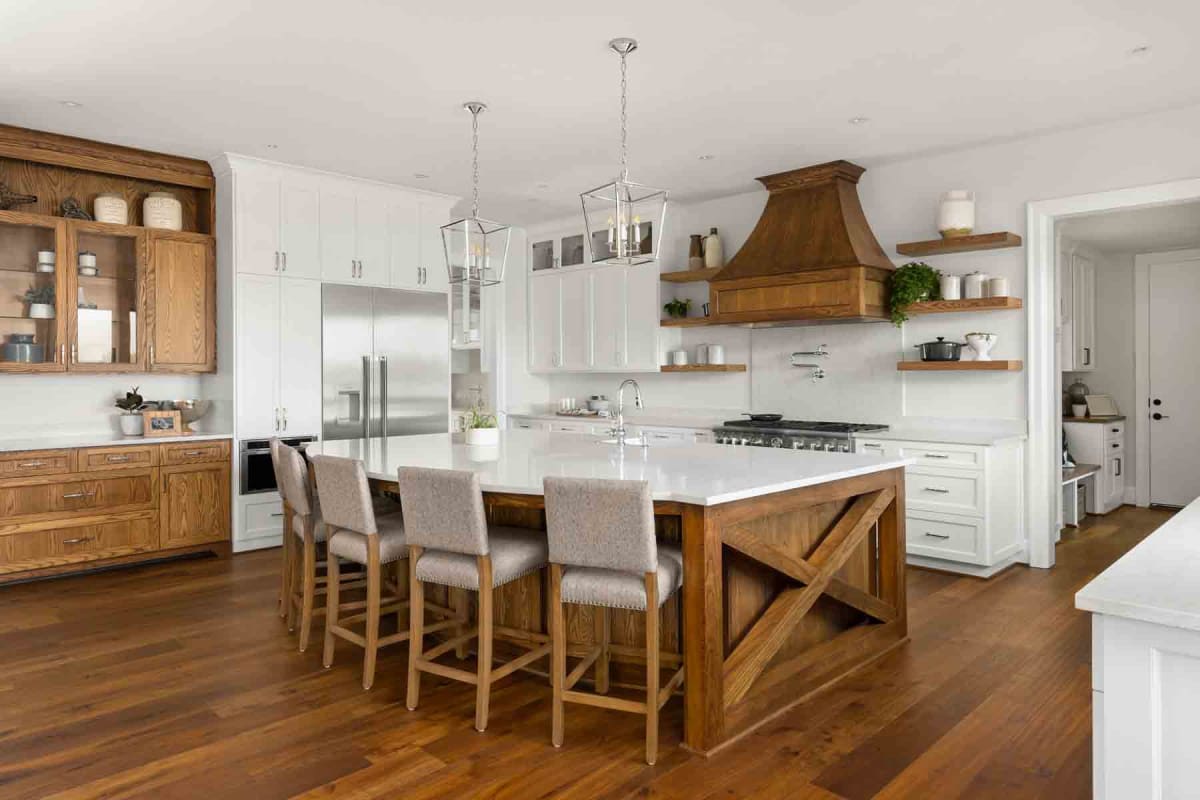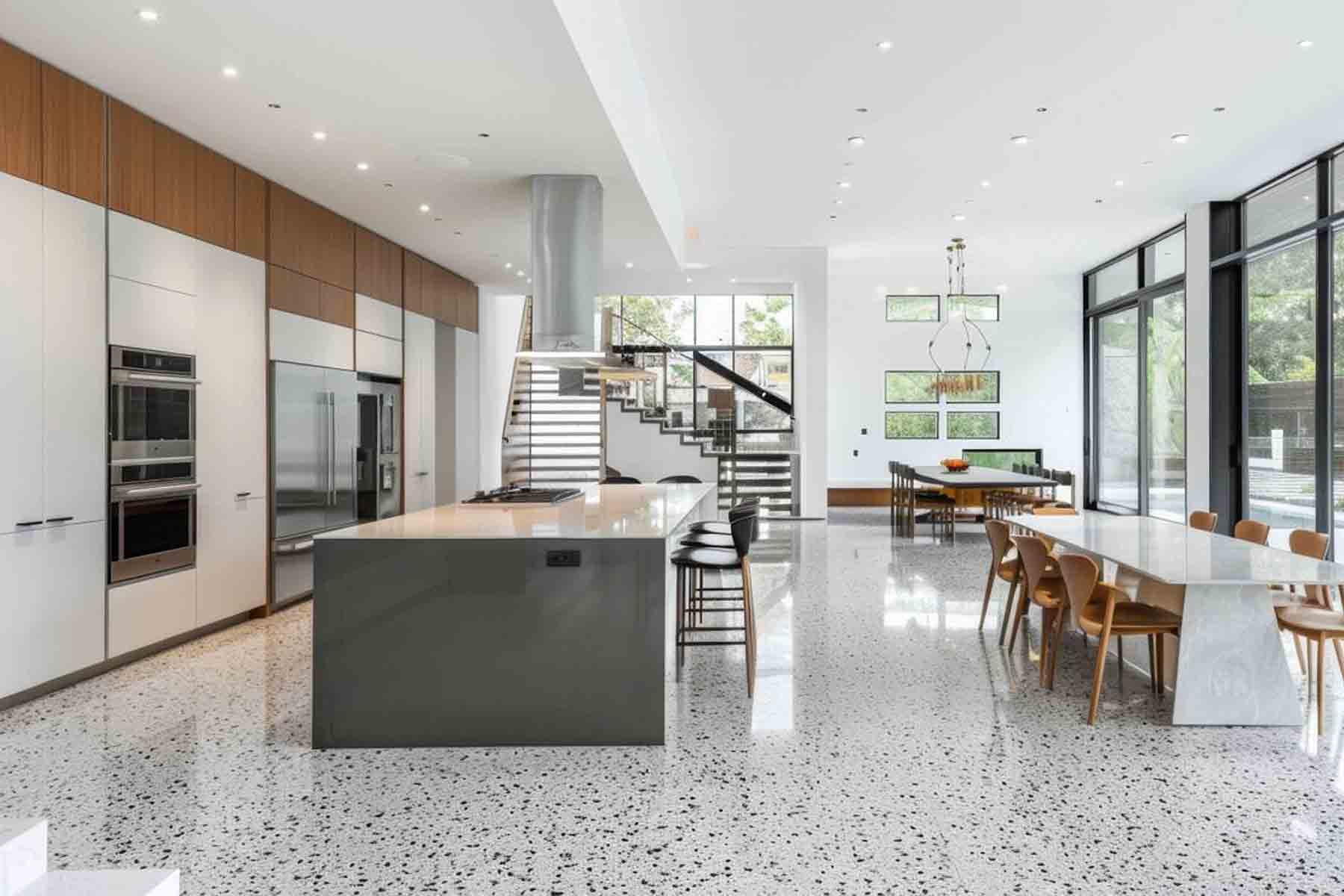
The Best Flooring for Kitchens
The Best Flooring for Kitchens
Our top picks: Best flooring for kitchen
Thinking about giving your kitchen a makeover? One of the biggest decisions you'll face is choosing the right flooring. With all the spills, foot traffic, and daily chaos, you need something that's tough but still looks amazing. Don't worry, we've got you covered with our favorite kitchen flooring options that combine style, durability, and practicality.
Best tile for kitchen floor
Tile remains a top choice for kitchen floors, thanks to its blend of style and resilience. Some popular choices include:
Ceramic tile
A practical choice for many homeowners is ceramic tile, beloved for its versatility and affordability. From solid colors to intricate patterns, ceramic tile offers endless design choices. The glazed surface resists stains and moisture, making cleanup a breeze, while its durability ensures it can withstand the demands of daily kitchen life.
Pros: Offers a diverse style at an affordable price, resists scratches and stains effectively, and simplifies cleaning
Cons: Can feel cold and hard underfoot, may crack upon significant impact, and requires diligent maintenance of grout lines

Stone tile
For a touch of natural elegance, consider stone tile to elevate your kitchen's aesthetic. With its unique variations in color and texture, each stone tile brings a one-of-a-kind look to your space. It's a durable option that adds a touch of sophistication and earthiness to your kitchen.
Pros: Brings a unique and elegant aesthetic, offers unmatched durability and longevity, and enhances overall home value
Cons: Comes with a higher upfront cost, requires sealing to ward off stains and moisture, and can be a slippery surface when wet

Luxury vinyl flooring
Another flooring option worth considering for the kitchen is luxury vinyl tile (LVT) or luxury vinyl plank (LVP), blending visual appeal and practicality. This flooring mimics wood or stone, offering a style to suit any design. LVT and LVP flooring provide comfort underfoot, reduce noise, and resist water and stains, making them ideal for a modern kitchen.
Pros: Waterproof and stain-resistant, comfortable underfoot and quieter than tile, realistic appearance of wood or stone
Cons: Can be susceptible to scratches from sharp objects, may fade in direct sunlight over time, and can be more expensive than basic vinyl options

Best waterproof flooring for kitchen
Spills are common in kitchens, so waterproof flooring is a smart choice. It protects your subfloor from water damage and comes in many stylish options. Two of our favorites are:
Sealed concrete floors
For a modern and industrial vibe, a concrete floor offers a bold look with durability and waterproof protection. Its versatility allows it to be stained in a range of colors, creating a truly customized space. Its seamless surface reduces maintenance and provides a sleek, contemporary aesthetic.
Pros: Extremely durable and long-lasting, waterproof and stain-resistant when properly sealed, versatile design options through staining and polishing
Cons: Can be cold and hard underfoot, requires sealing to prevent cracking and staining, and can be expensive to install and maintain

Terrazzo floors
A high-end kitchen deserves high-end flooring, and terrazzo is a fantastic choice. This type of floor features colorful chips of marble, glass, and other materials, creating a vibrant and eye-catching design. Best of all, its smooth, seamless surface resists water penetration, making it a practical and beautiful choice for your kitchen.
Pros: Durable and low-maintenance, offering a unique and luxurious design
Cons: Expensive to install and can be slippery and cold underfoot

Best wood flooring for kitchen
Many people love the idea of wood floors extending into the kitchen, creating a cohesive and warm feel throughout the home. The good news is you can make that dream a reality, as long as you choose the right type of wood flooring that can handle the demands of kitchen life. Some options include:
Solid hardwood
Hardwood brings timeless beauty to any space, making it a desirable flooring choice. However, kitchens present unique challenges for this material. Solid hardwood is susceptible to warping from water damage, which makes it a less-than-ideal choice for areas prone to spills.
Pros: Adds warmth and character, increases the overall value of your home, and the surface can be refinished many times if it becomes worn or damaged
Cons: Vulnerable to damage from water, requires regular maintenance to keep them looking their best, and is a more expensive flooring choice

Bamboo floors
If hardwood seems too risky, consider bamboo—a sustainable and stylish alternative. This eco-friendly flooring offers a unique grain and warmth, blending responsibility with kitchen performance and elegance.
Pros: Sustainable and eco-friendly, brings a unique and stylish aesthetic to the kitchen, and is durable, resisting scratches and stains well
Cons: Can be susceptible to water damage if not properly sealed, quality can vary significantly between brands, and the color may fade in direct sunlight over time

Engineered hardwood
If you love the look of hardwood but prefer more resilience, engineered hardwood is a smart alternative. Engineered hardwood is crafted with layers of wood veneer bonded together to minimize expansion and contraction, which makes it a better contender for kitchen use.
Pros: Provides the look and feel of real wood and is more resistant to moisture than solid hardwood
Cons: Can still be damaged by excessive moisture, doesn't add as much home value, and has limited refinishing potential

Laminate floors
For a budget-conscious kitchen upgrade with a wood-like appearance, laminate flooring is worth exploring. Laminate provides the look of wood without the associated high cost. Constructed from layered composite materials, it features a wood-grain image protected by a durable wear layer. While laminate resists surface spills, prompt cleanup is essential to prevent moisture penetration.
Pros: Laminate is a budget-friendly flooring choice that offers stylish designs that mimic the look of wood. Installation is simple and straightforward, making this an appealing choice.
Cons: This material has limited resistance to moisture, is prone to scratches, and lacks the feel of real wood.

Worst kitchen floors
We've explored some of the best materials to use in your kitchen, but it's equally important to know what to avoid. Not all flooring options are up to the challenge of a busy kitchen, so here's a breakdown of the worst choices to help you steer clear of potential problems:
Carpet: It goes without saying that carpet absorbs spills and stains like a sponge. It also traps odors and is a breeding ground for bacteria – a definite no-no for kitchens!
Solid hardwood (without proper sealing): While beautiful, it's susceptible to water damage, warping, and staining if not meticulously sealed and maintained.
Low-quality laminate: Cheap laminate can peel, bubble, and warp when exposed to moisture, making it a poor choice for wet kitchens.
Porous natural stone: Some natural stones like certain types of marble or sandstone are highly porous and can easily stain or etch from acidic foods and spills.
Unsealed cork: While comfortable, unsealed cork is highly absorbent and can be easily damaged by water and spills.
Linoleum (outdated): While durable, it's susceptible to gouges and discoloration, plus it can look dated.
Kitchen flooring installation costs
With so many amazing kitchen flooring options out there, it's important to consider your budget before deciding on the top pick for your project. We've put together a handy table that breaks down popular kitchen flooring materials and costs to help.
| Flooring material | Average cost per square foot installed |
|---|---|
| Ceramic tile cost | $12 – $40 |
| Stone tile | $10 – $50 |
| Luxury vinyl flooring cost | $4 – $16 |
| Polished concrete floor cost | $3 – $15 |
| Terrazzo flooring cost | $20 – $50 |
| Solid hardwood floor cost | $11 – $25 |
| Bamboo flooring cost | $7 – $17 |
| Engineered hardwood | $7 – $20 |
| Laminate flooring cost | $4 – $14 |
Best floor for kitchen FAQs
What is the best flooring for a kitchen?
Ceramic tile is often considered the best kitchen flooring due to its durability, water resistance, and ease of cleaning, making it ideal for high-traffic areas. Luxury vinyl plank (LVP) is another great durable, water-resistant option that mimics the look of hardwood flooring.
What type of flooring is best for a small kitchen?
To make a small kitchen feel larger, consider using the same waterproof flooring material throughout the kitchen and in adjacent living areas, creating a seamless and expansive look.
What is the best cushion flooring for a kitchen?
Luxury vinyl plank (LVP) is a great option for cushion flooring in kitchens; it's waterproof, soft underfoot, and mimics the look of hardwood while providing comfort.

Getting estimates from flooring installers
Ready to install new kitchen flooring? These tips can help you get accurate and fair estimates from flooring installers near you:
Contact at least three different flooring contractors to compare pricing and services.
Ensure each estimate includes a breakdown of all costs, including materials, labor, removal of old flooring, and any subfloor preparation.
Verify the contractor's reputation by checking online reviews and asking for references from previous clients.
Confirm that the contractor is licensed and insured to protect yourself from liability in case of accidents or damage.
Ask about warranties on both the materials and the installation work.
Carefully review the contract before signing. Pay attention to payment terms, project timelines, and any cancellation policies.
Request an on-site inspection to ensure the estimate accounts for any unique challenges or requirements.
Be specific about the type and quality of flooring material you want to be installed to ensure accurate pricing.
Questions to ask a floor installer
Ask these important questions before hiring a flooring installer:
Can you provide proof of your license and insurance coverage?
How many similar kitchen flooring projects have you completed, and what flooring types are you most experienced with?
Do you have a portfolio or references I can review to see examples of your previous kitchen flooring installations?
Can you provide a written estimate that breaks down all costs, including materials, labor, and any potential additional charges?
What is your estimated timeline for completing the kitchen floor installation, and how do you handle any potential delays?
Will you handle the removal and disposal of my existing kitchen flooring?
What type of subfloor preparation is necessary for my chosen flooring, and how will you ensure it is properly prepared?
What is your process for addressing unexpected issues or complications that may arise during the installation?
Do you offer a warranty on your workmanship, and what does it cover?
What is your payment schedule, and do you require a deposit before starting the project?